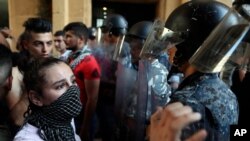Analysts and activists alike are demanding that rampant corruption that has eroded Lebanon’s governing system be uprooted. Supported by the United States, the European Union’s recent adoption of a new sanctions regime on Lebanon’s corrupt players is seen by observers as one way forward to tackling the endemic problem while pressing for the formation of a new government.
The U.S. secretaries of state and Treasury, Antony Blinken and Janet Yellen, welcomed the E.U.’s new sanctions targeting corrupt figures in Lebanon. A joint statement on July 30 said the United States “looks forward to future cooperation with the EU in our shared efforts."
Mona Yacoubian of the United States Institute of Peace told London’s Chatham House research group that targeted sanctions are important as is government formation and systemic reform in Lebanon. She notes that power broker Hezbollah and other actors are able to exploit weak institutions.
“Sanctions that seek to address those particular members of the political class who are most corrupt and who are obstructing the need to form a new government include things like travel bans, asset freezes, and so forth," said Yacoubian.
"If done in a concerted effort by the U.S., France, EU and even Gulf countries that might yield what Lebanon desperately needs right now. Any policies that assist the Lebanese with building strong, accountable, transparent institutions, those policies are the most potent antidote to corruption and also allow a significant counterweight to Hezbollah."
Besides being a militant group, Hezbollah is a political party with lawmakers in parliament.
Yacoubian warns that Lebanon is undergoing “a slow-motion implosion” and urges the West to ramp up support to the Lebanese armed forces. She said it remains the “one state institution standing between where we are today and total chaos.”
Recently, telecoms tycoon Najib Mikati was designated as prime minister and tasked with forming a Cabinet of specialists to carry out reforms required by the international community to unlock badly needed funds for the crisis-wracked country—something that dogged his predecessor for nearly a year. Questions remains as to whether he will be successful in forming a Cabinet.
Meanwhile, anti-corruption activist Badri Meouchi told Chatham House that Lebanon’s civil society is working together to press for laws combating corruption in several key sectors, with a draft law on public procurement on the table. But he stresses that ultimately a change in how Lebanon is governed is needed.
“Whatever laws we look at in the anti-corruption arsenal of reforms, you cannot expect those who benefit from the system to change the system. It’s time to wake up. This ties to one of the key recommendations in that we need new leadership in this country. This leadership is corrupt to the core,” said Meouchi.
Writing in the Saudi Arab News daily, political commentator Baria Alamuddin warned that “if we allow Lebanon to continue fragmenting, it opens the door to catastrophes of an infinitely greater magnitude than the port explosion. This disaster must be our wake-up call for inaugurating a new Lebanon.”
Alamuddin calls for “collectively banishing” those she describes as having “colluded in Lebanon’s downfall and who remain wedded to a medieval and inherently corrupt sectarian system.” She says citizens should unite “to rebuild a secular, sovereign nation rooted in the rule of law and justice for all.”




